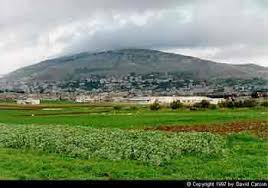Jacob’s Disobedience at Shechem
33: 18-20
Jacob’s disobedience at Shechem DIG: Instead of immediately returning to Bethel as God had commanded (31:3,13), Jacob lingered at the city of Shechem. How did this put his family needlessly at risk?
REFLECT: Whether it has been your sinful cravings, the lust of your eyes, or the boasting of what you have and do (First John 2:16), when have you stopped to linger in your life? How do you catch yourself or get out of that trap before it’s too late?

Jacob probably stayed longer in Succoth than he had originally planned, but he eventually moved on and arrived safely at the city of Shechem in Canaan. It was not very far from Succoth, directly west of the Jabbok River and about twenty miles from the River Jordan. God had said that He would be with Ya’akov (28:15, 31:3), and the fact that he arrived safely back in Canaan was the fulfillment of that promise. According to the Canaanite society of that day he was a non-citizen, so he camped within sight of the city (33:18).
For a hundred pieces of silver, he bought from the sons of Hamor, the father of Shechem, the plot of ground where he pitched his tent (33:19). God had promised him the whole Promised Land, but this was the only part that Jacob actually owned. The land was excellent for his flocks and herds to graze. In addition, he dug a well that became known as the well of Sychar (John 4:6, 11-12). Years later, this was where the bones of Joseph would be reburied (Joshua 24:32). Shechem became an important city in biblical history. Located on Mount Gerizim, it would later become the territory of the tribe of Ephraim. It was very close to the city of Samaria, which became the capital of the northern kingdom of Isra’el. When Jacob arrived there, the city was controlled by the Hivites, a Canaanite tribe, which was ruled by a man named Hamor. He had a son named Shechem, which the city was eventually named after. Although the text does not mention it, Ya’akov must have visited Isaac and Esau several times during his stay in Shechem.517
There Jacob set up an altar and called it El Elohei Isra’el, literally meaning God, the God of Israel (33:20). This was the first use of his new name. But God didn’t want the altar in Shechem; He wanted it in Bethel, as we shall see shortly.
Awesome God, thank You for revealing Yourself to Your people, Isra’el. Thank You for continuing to reveal Yourself to all who call upon Your name.



Leave A Comment